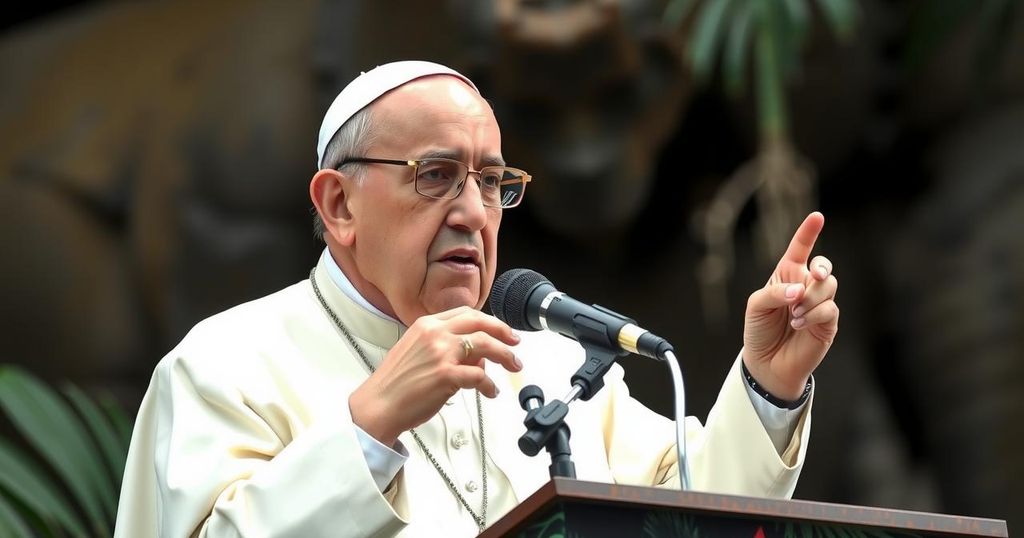Pope Francis visited Papua New Guinea, urging that the nation’s vast natural resources benefit all citizens instead of just a privileged few. He highlighted that, despite significant wealth from these resources, poverty remains pervasive. The Pope also called for an end to the prevalent tribal violence affecting communities, seeking peace and development in the region.
During his visit to Papua New Guinea, Pope Francis emphasized the need for the country’s natural resources to benefit the broader community, rather than only a select few. He acknowledged Papua New Guinea’s cultural richness and its vast reserves of gold, copper, and gas while lamenting the fact that the wealth generated from these resources has not significantly improved the living conditions for most of its 12 million citizens. Pope Francis stated, “These goods are destined by God for the entire community” and urged that the benefits should extend beyond international corporations to ensure that local needs are prioritized.
The Pope highlighted the paradox of resource abundance juxtaposed with pervasive poverty, where a significant portion of the population lives without access to basic amenities such as electricity. Young pilgrims, like Jonathan Kais from Manus Island, expressed hope that the Pope’s words would prompt governmental accountability and improved service delivery. Despite substantial investments by multinational companies, resources have not translated into tangible benefits for local communities, as evidenced by economic studies showing stagnant poverty levels amidst economic growth.
Pope Francis also made an earnest appeal for an end to the prolonged tribal violence that plagues Papua New Guinea, a situation exacerbated by modern issues such as unemployment and population growth. He urged citizens to “stop the spiral” of violence, which has resulted in significant loss of life and widespread displacement. Moreover, the presence of modern weaponry has escalated conflicts, marking a stark departure from traditional methods of tribal warfare. Both the government and communities are grappling with these challenges amidst a backdrop of ineffective suppression strategies.
Pope Francis’s visit to Papua New Guinea serves not only as a call for social justice regarding resource-sharing but also highlights the critical need for peace and development in a nation rich in natural beauty and diversity but struggling with significant socio-economic issues.
Pope Francis’s visit to Papua New Guinea brought attention to the ongoing challenges facing the nation, particularly regarding the equitable distribution of its natural resources. Papua New Guinea, rich in minerals and energy reserves, paradoxically struggles with widespread poverty and inadequate public services. The juxtaposition of the country’s wealth and the dire living conditions of its citizens illustrates systemic issues related to governance and resource management that have persisted for decades. This context is further complicated by a legacy of tribal violence, which the Pope emphasized must be addressed for the nation’s development and peace.
In conclusion, Pope Francis’s remarks during his visit to Papua New Guinea resonated deeply with the populace who seek justice in the utilization of the country’s natural resources. By calling for the wealth derived from these resources to benefit all citizens, the Pope not only highlighted a critical local issue but also drew attention to a global challenge faced by resource-rich nations. His appeal for peace in the face of tribal violence underscores the urgent need for socio-economic reform and reconciliation in Papua New Guinea.
Original Source: www.voanews.com






